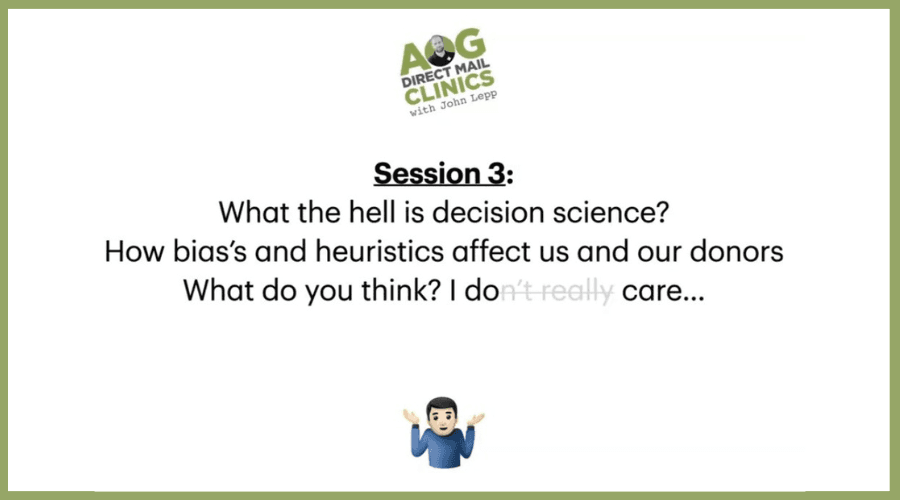Direct mail clinic #3 – How do humans make decisions?
Why are so many fundraisers talking about decision science? In this clinic, John Lepp explains that understanding what drives donor decisions is key to improving your direct mail appeals. It is a great place to start on your decision science journey, so watch this clinic and get to know how you can apply these techniques to your next campaign.
- Written by
- Carolina Herrera
- Added
- April 01, 2025

Okay, John accepts that he’s a bit nerdy when it comes to direct mail. So, it’s no surprise that he’s spent some time learning more about decision science and how it impacts the work we do.
Decision science is hugely important to fundraising because what you think often just doesn’t matter. Instead, you should focus your thoughts on how and why your donor makes their decision.
Fortunately, this clinic is a quick introduction to the three things that influence decision making:
1. The past
As humans, we constantly scan our environments. We stay away from loss or failure. We do what we can to survive. We are a species on the move. We need to feel like we’re part of a group. We often do what others do. And everything we’ve experienced in the past, impacts our future decisions.
But what does all this have to do with fundraising and your direct mail packs? Watch the clinic below, because John tells you more.
2. Our brains
The brain is a fascinating muscle and neuroscience helps us to see why humans make certain decisions. John talks you through some of various biases that impact our decision making – like the IKEA effect (when we love and value something the more effort we put into it).
Crucially, John also shares why he puts eyeballs on everything... yes you read that right and he does have a very good reason for doing so!
3. The real world
The real world influences our decision making. And as fundraisers, we have to start with the donor’s point of view, consider their experiences, and think about what impacted their generation.
In this section, John discusses why getting to know what’s going on in your donor’s world is key to your success.
Ultimately, this clinic is your introduction to decision science.
It is a reminder that, yes, it’s tough doing direct mail. It’s not for the faint of heart. You have to show up and invest your time in understanding how people make decisions. But if you check your bias at the door, and don’t listen to people who use subjectivity in their decision making, your appeals will get better – engaging more donors and raising more money along the way.
Watch AOG direct mail clinic #3 – How do humans make decisions?

John Lepp (he/him) is a fundraiser, designer and donor champion with more than 20 years of experience working with charities across Canada and around the world. As partner at Agents of Good, he helps charities tell stories that inspire donors to give, both online and offline. John is a respected and coveted international speaker who has travelled the world encouraging fundraisers be more human and vulnerable with those other amazing humans we call donors.
His latest book, Creative Deviations offers plenty of tips for how fundraisers can infuse their storytelling, fundraising and direct response with more creativity.

















